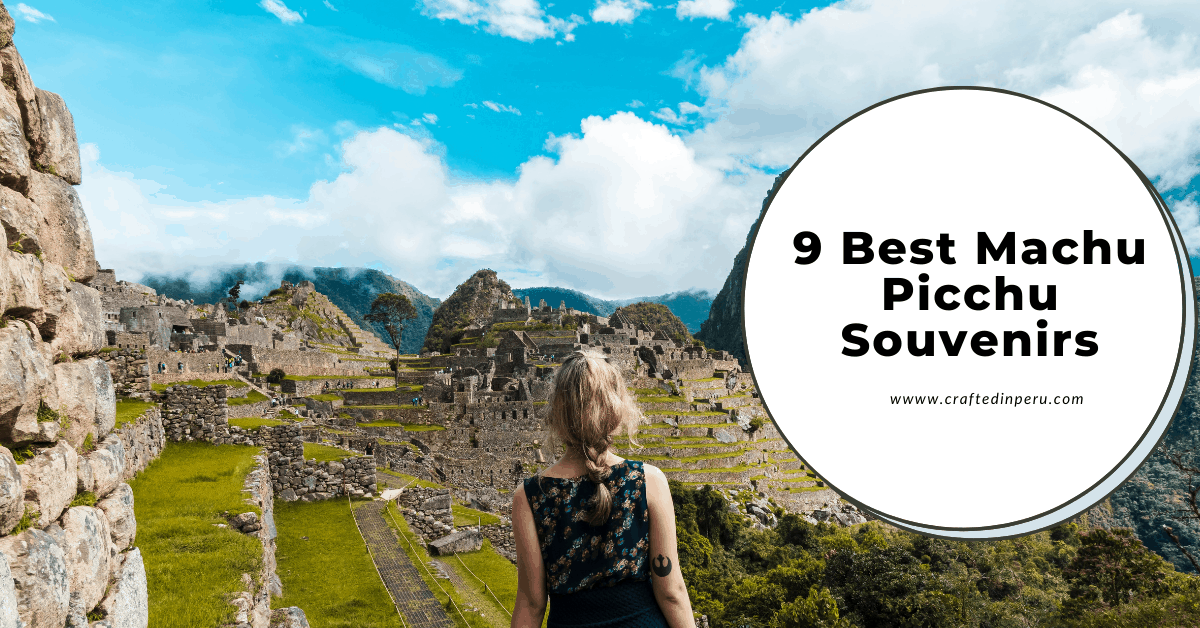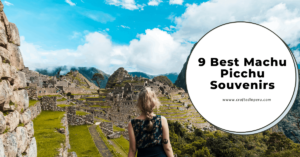The cultural and natural UNESCO World Heritage site Machu Picchu stands as one of the most unique and genuinely breath-taking sites, blending geographical magnificence with incredible human ingenuity and craftsmanship. Those lucky tourists who visited the New Seven Wonders of the World site can only speak in awe of the ancient Inca civilization’s icon.
Tourists who plan to go on holiday, trekking or backpacking across Peru and to the site of Machu Picchu will want to mark their time there with a souvenir. Depending on the traveler type, each keepsake has its significance and transportation considerations, and we want to share these with you.
Perhaps you are an Inca or Machu Picchu enthusiast. Maybe you want to get a Peruvian gift for a friend. Either way, we have created for you this list of the best souvenirs to buy for your Peruvian holiday to Machu Picchu.
Decorative Machu Picchu Replica Statue/Model
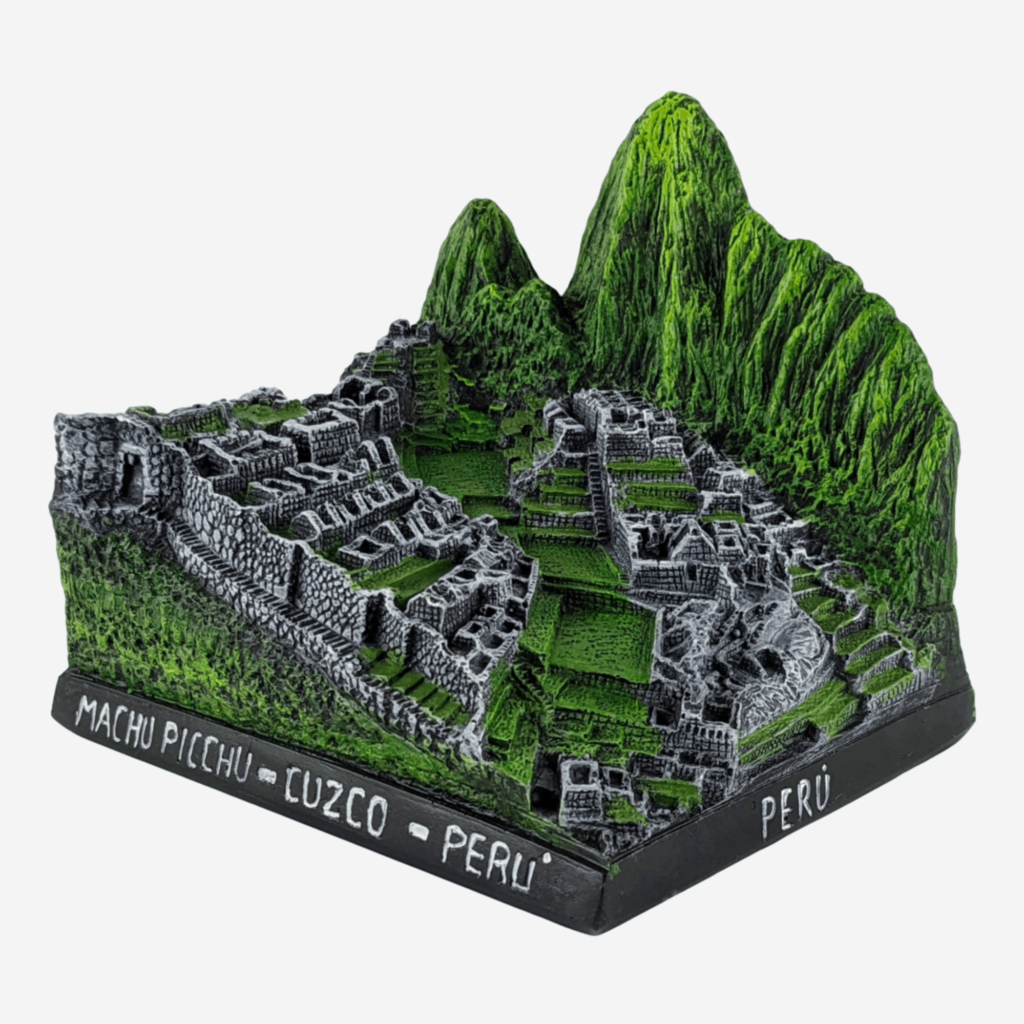
A model replica of the 15th century Inca citadel, Machu Picchu is a perfect souvenir that instantly transports you back to the Inca-style ruins with a glance. Buying a Machu Picchu replica model handmade by a Peruvian artisan supports local craftsman in Peru. The replica statue depicts the Inca-style polished stone-walls and details the landscape of the main village of Machu Picchu.
Model collectors would appreciate the ceramic craftsmanship of the Machu Picchu statute. History and geography enthusiasts can enjoy the attention to detail and the captured essence of the site. Other uses for the Machu Picchu diorama are for educational and instructional purposes.
Souvenir Particulars:
- Only souvenir that directly references Machu Picchu site – a visual reminder
- Online buying options avoid weight allowance issues on the return flight
- Handmade by Peruvian artisans
- Meets custom requirements worldwide
- Lasting souvenir
Souvenir Considerations:
- It is a large and heavy display so will need room
- Not easily transportable, so online purchase is the best option.
If you want something that directly relates to Machu Picchu, then consider a Machu Picchu decorative model.
Recycled Bull Horn Smoking Pipes
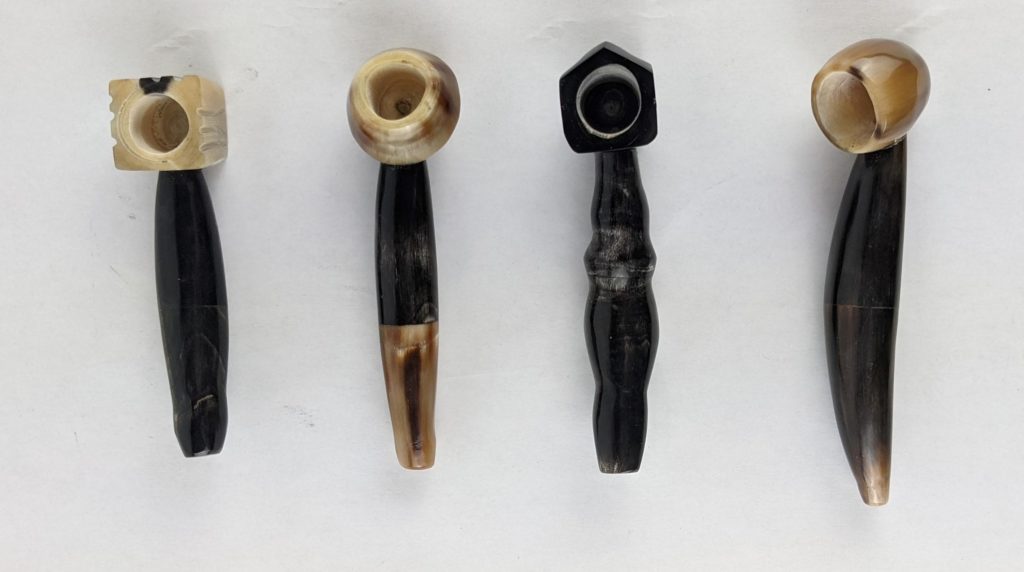
For environmentally-conscious tourists, a bull horn smoking pipe is 100% natural, organic, non-toxic, biodegradable, eco-friendly, and animal cruelty-free. These smoking pipes are beautifully hand-crafted pipes that make excellent Peruvian gifts for smokers or eco-friendly people.
Bovine horn craftsmanship is traditional Peruvian artistry that Peru’s Indigenous people adapted after Spanish colonialization. Pre-Hispanic culture used condor bone carvings for conventional and ceremonial accessories, jewelry, and instruments. The introduction of cows, bulls, and goats gave Indigenous people a far more abundant natural material to carve into instruments such as smoking pipes. The smoking pipe craftsmanship is still found today.
Souvenir Particulars:
- Made by Peruvian artisans
- Hypoallergenic
- 100% natural and organic
- Ethically and Sustainably sourced souvenir
- Biodegradable
- Easily transportable
- Easily found in markets and online
Souvenir Considerations:
- May have to declare products for customs in countries like Australia, UK, New Zealand
Alpaca Wool Souvenir
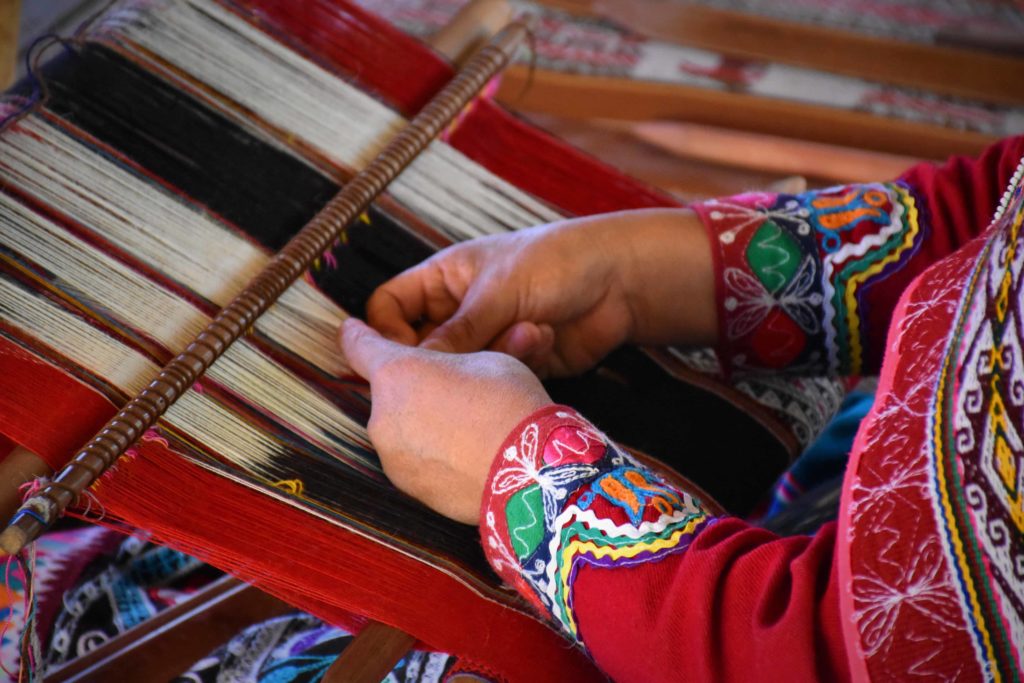
Many tourists consider buying products made from Alpaca wool– as it is the most Peru-affiliated animal worldwide. Llamas, alpacas, and vicuña wool is widely used in textiles across Peru. Some garments use baby alpaca wool as it is incredibly soft – especially common in scarfs.
Many stalls line the village markets around Machu Picchu, and there are many souvenir stores and gift shops. It is incredible to see the array of colors in the traditional Peruvian styles. You can purchase all kinds of garments and home décor such as Peruvian ponchos, blankets, scarves, sweaters.
Souvenir Particulars:
- Various color options
- Various garment options
- Easily transportable
- Cheap souvenir
Souvenir Considerations:
- Allergy and skin irritation possible
- Ensure you are buying authentic Alpaca gear, as many are blended with synthetic wool
- Not usually suitable for washing machines
Peruvian Embroidery
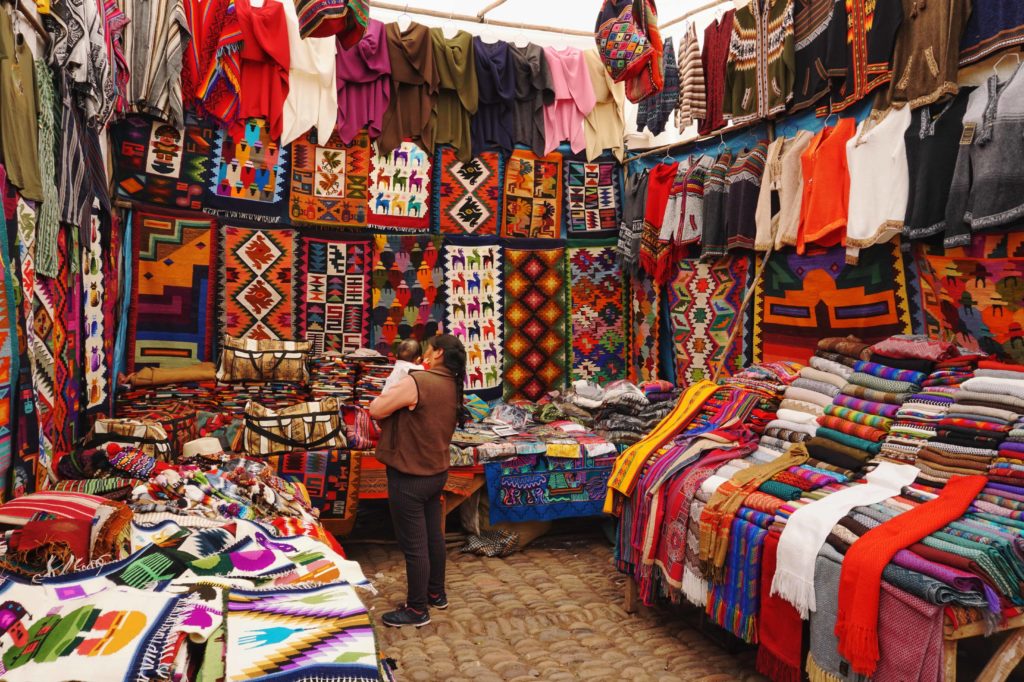
Embroidery is a prevalent Peruvian tradition and is embedded into the local culture of Peru for millennia. In pre-Hispanic cultures, including Inca, the embroidery was often used for ceremonial purposes.
Today, embroidery traditions connect to local identity and memory. Each region and each village in Peru have a unique embroidery style. Purchasing embroidery from local villages around Machu Picchu is tapping directly into Inca culture and traditions.
All markets can hand stitch embroidery directly onto tourists’ garments such as jeans, skirts, bags, hats, etc. You can also purchase already made items like pillowcases, handbags, and keychains.
Souvenir Particulars:
- Made by Peruvian artisans
- Easily found in markets
- Easily transportable
Souvenir Considerations:
- Takes time
- You may need to bring garments or be prepared to wait
- Not usually suitable for washing machines
Peruvian Chullos
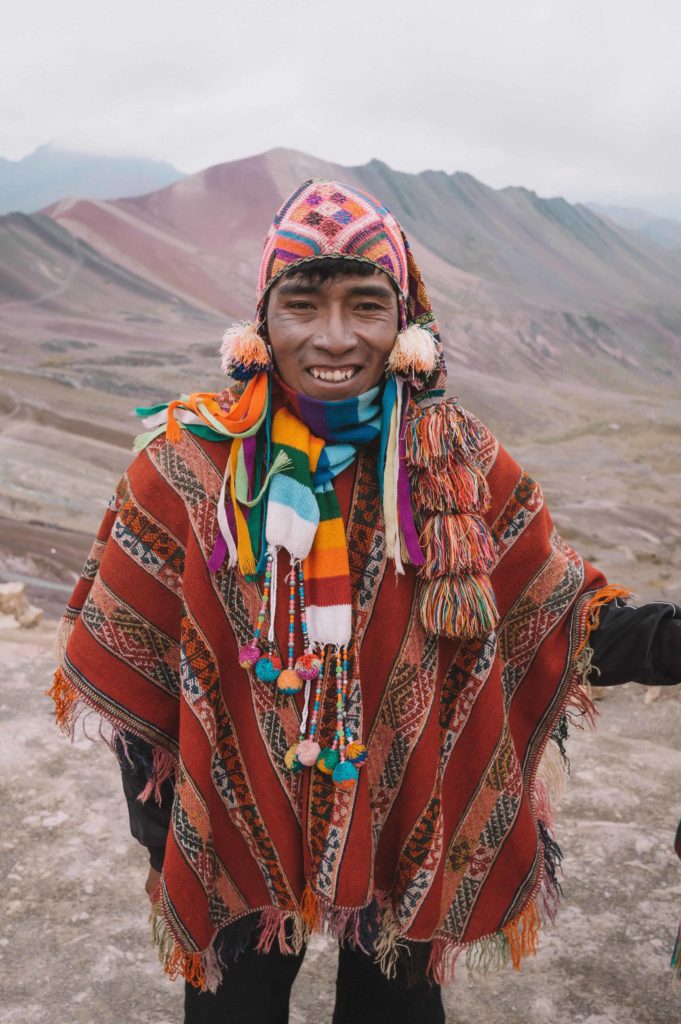
A Chullo is a hat that originates from the Peruvian Andes – a knit cap with earflaps. You can style them with the flaps open or tie them under your chin for extra protection and warmth. Like all textile products in Peru, Chullos come in many different colors, patterns, designs, and traditional styles.
Souvenir Particulars:
- Various color options
- Various design options
- Easily transportable
- Cheap souvenir
Souvenir Considerations:
- Allergy and skin irritation possible
- Be sure to buy authentic Alpaca, as many are blended with synthetic wool
- Not suitable for washing machines
Andean Panpipe
A traditional Andean panpipe, known as a siku or a zampoña, originates from Aymara indigenous culture around Lake Titicaca. Traditionally carved from condor’s bone, today they are commonly crafted from bamboo. They come in various sizes, which dictates different musical pitches that are preferential to diverse cultural communities.
Souvenir Particulars:
- Easily Available from markets
- Easily transportable
- Easily found in markets
- Cheap souvenir
- Hypoallergenic
Souvenir Considerations:
- It is not specific to Machu Picchu or Inca culture
Andean Rústicas Dolls
As in many cultures, ancient or modern, dolls are bound in traditions and community identity worldwide. Archaeologists have found ancient dolls across Peru.
A notable discovery was of the ancient Chancay dolls who lived on the Peruvian coast from 1000 to 1400 CE. The Chancay doll, named after the Chancay culture, had embroidered simple faces, long, rectangular, legless bodies made from woven vegetation.
Other, Indigenous Peruvian dolls follow these similar designs, but with subtle differences that are distinct to the cultural communities.
Tourists can buy Peruvian dolls, or rústicas, that resemble the ancient Chancay dolls but are decorated in an Andian-style. Tourists can find the dolls dressed in traditional skirts and embroidery from various markets. Some are unique and come with their hats and accessories. They make perfect gifts for children or doll collectors.
Souvenir Particulars:
- Various color options
- Various garment options
- Easily transportable
- Easily found in markets
- Cheap souvenir
Souvenir Considerations:
- Not usually suitable for washing machines
Ekeko Doll
Are you interested in some Peruvian mystery and culture? Then an Ekeko doll is just for you! Ekeko for the Tiwanaku people – people on the border of Peru and Bolivia – is the god of prosperity and plenty. This religious symbol in clay doll-form is usually depicted as a mustachioed man in traditional Peruvian dress – poncho.
As symbolic of the god of plenty, the doll is always accessorized with bags and baskets. Sometimes the bags might be full of grain or food, but it is ultimately up to the doll’s owner to ensure it is comfortable, prosperous, and full. One hilarious variation of the Ekeko doll comes with a hole in its mouth for s cigarette – cigarette not provided!
Ekeko dolls are a great culturally significant gift or souvenir. Just be sure to tell the owner it needs to be displayed in a place of honor to bless the house!
Souvenir Particulars:
- Various color options
- Various garment options
- Easily found in markets
- Cheap souvenir
Souvenir Considerations:
- Can break in transit – made from clay
- It is not specific to Machu Picchu or Inca culture
Torito de Pucara – Clay bull figurines
Torito de Pucara or Clay bull figurines are visible on the top of house entryways or in marketplaces. The bull is an important symbol of strength, protection, and prosperity in Peruvian culture, adapted after Spanish colonization. Artisans in a small town between Cuzco and Puno began making these clay figurines to symbolize the bull’s cultural representation. They quickly became a cultural icon.
The bulls typically represent prosperity and are a symbol of fertility for newlyweds. However, the color of the bull is also symbolic with meaning and wishes.
Red: protection and love
Orange: joy and fun
Yellow: energy, and good luck
Green: economic prosperity, fertility, and good health
Blue: confidence, fidelity, and friendship
black: protection against envy
white: peace
Unpainted: family protection
Souvenir Particulars:
- Made by Peruvian artisans
- Easily found in markets
- It can be customized in color and sizes
- Natural products
- Cheap souvenirs
- Culturally significant gift
Souvenir Considerations:
- Delicate and may be damaged in transit
- May not meet custom requirements globally
- It is not specific to Machu Picchu or Inca culture
Peru has a rich culture with beautiful artisans and craftsmen. You can easily find souvenirs that fit your needs and interests. If you want something that directly relates to Machu Picchu, then consider a Machu Picchu decorative model.
If you are interested in other great souvenir ideas, consider the article on Peruvian Bovine Horn Souvenir.

